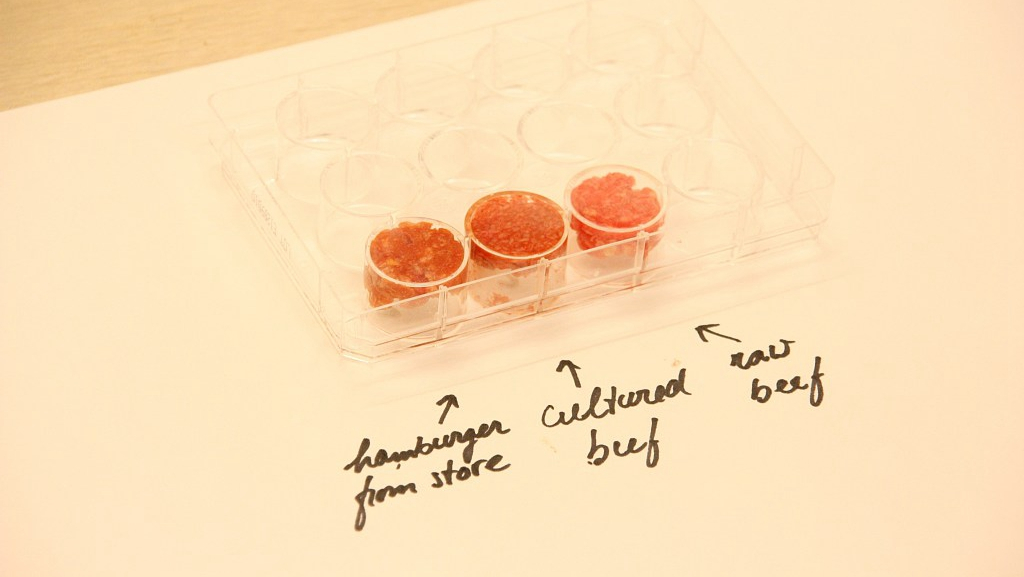
Food
15:44, 15-Mar-2019
U.S. lawmakers tuck into juicy debate over meat substitutes
CGTN

Towering over a wooden podium in the Arkansas General Assembly this month, Republican representative David Hillman, a self-declared calf-roper, spoke of steak to pitch his latest bill.
“I want my rib-eye steak to have been walking around on four feet at one time or another,” he said. His proposal, making it illegal for meat-substitute products to be labeled as meat, was swiftly adopted.
Across the United States, tens of similar bills have been introduced - some unsuccessfully - as well as half a dozen with opposing aims, as an out-of-sight battle heats up between friends and foes of plant-based meat.
One key issue at stake is whether the rise of alternative meat in the world's largest beef and veal-producing nation could substantially reduce its planet-warming emissions.
Rearing animals is a major driver of climate change - accounting for nearly 15 percent of greenhouse gas emissions - while producing meat uses land and water less efficiently than growing crops, the UN Food and Agriculture Organization says.
Increasingly, many environmentalists are placing their hopes in greener alternatives for carnivores, including lab-grown meat.
Led by plant-based foods, which mimic the taste, texture and look of meat, the U.S. alt-meat market is forecast to nearly double to 2.5 billion U.S. dollars by 2023, according to market research firm Euromonitor International.
Lab-grown meat is not yet being sold.
The trend has put the country's half-a-million meat-industry workers on edge, and prompted more than 20 meat-producing states, from Wyoming to Indiana and Nebraska, to look at adopting legislation similar to Hillman's, according to The Good Food Institute, a nonprofit that promotes meat alternatives.
In contrast, legislative bodies in states with enthusiastic backers of vegan diets - green groups, animal rights activists and health campaigners - have pushed bills encouraging plant-based food, first in California, followed by Washington D.C., New York and Oregon.
Hospitals and schools
In California, which made history last year with a law guaranteeing “plant-based meals” for hospital patients, tutor and homemaker Genelle Palacio said her support for a follow-up effort aimed at schools came from personal experience.
The bill for schools has a “reasonable chance” of making it past the committee examining it, said Kristin Olsen, a former California Republican lawmaker who was vice chairwoman of that committee.
Palacio, 40, recounted her wild goose-chase for a vegan option in a southern California hospital in the summer of 2014, about two hours after she gave birth to her second son.
The mother of four was offered Oreo cookies, potato chips, a turkey sandwich, Pepsi and coffee, which she rebuffed.
“They sent me chicken broth next,” she told state lawmakers at a hearing last April. “They said there's no chicken in the soup,” she added, prompting laughter in the audience.
Her ordeal, which ended with a Chinese stir-fry her husband fetched from a nearby restaurant, ignited her quest to make plant-based options more widely accessible, including for her vegan children in their school cafeteria.
“My kids should be able to eat at their school just like their peers,” she said in a phone interview.

Animal agriculture has emerged as one of the major causes of global warming. Scientists have successfully produced meat in the laboratory to control the grim scenario . /VCG Photo
Animal agriculture has emerged as one of the major causes of global warming. Scientists have successfully produced meat in the laboratory to control the grim scenario . /VCG Photo
New York City became on Monday the largest U.S. school system to serve all-vegetarian food in public schools once a week as part of a global movement to cut down on meat-eating.
In the Palacio household, a “Beyond Burger” patty made from plants, including pea protein, has become a popular dinner dish for the children.
The product is sold in 13,000 grocery stores since California-based firm Beyond Meat, which is backed by Microsoft Corp founder Bill Gates, launched it on the retail market in 2016. Two patties cost 5.99 U.S dollars at one New York City supermarket.
Worried Cattlemen
In Nebraska, which has the nation's second-highest heads of cattle after Texas, Pete McClymont of the state cattlemen's association described the worry among his 4,000 members at the rise in plant-based products like Beyond Burger, which looks just like ground beef.
On one day alone in early March, the executive vice-president of Nebraska Cattlemen received three emails from members asking him to soldier on in defense of real meat.
“This goes to their livelihood and what they do every day,” he said. “You get tied to the land, you get tied to the animals and it's just part of who you are.”
His group is among those that helped shape a state bill seeking to outlaw the marketing of meat alternatives as meat.
If alarm bells are ringing in cattle country, it is largely because farmers fear a repeat of what many consider a debacle over milk, said McClymont, a fourth-generation cattle farmer.
While cow milk remains an American home staple, its sales have tumbled by nearly 19 percent since the market peaked four years back, according to research firm Mintel.
More than half of consumers who now buy less dairy milk consume more of the non-dairy kind, including almond, coconut and soy, a 2018 report by Mintel noted.
The popularity of those beverages has been partly attributed to their labeling as milk.
Similarly, if plant-based and lab-grown meats continue to be loosely identified as “meat”, they could make a dent in the 110-billion U.S. dollar meat market, said Ernest Baskin, an assistant professor of food marketing at Saint Joseph's University in Philadelphia.
“If you label something a meat, that means this is a substitute for a dinner or lunch opportunity where I would otherwise eat meat,” said Baskin.
Ultimately an acquired taste for meat alternatives, rather than laws, will likely determine whether consumers call them meat, he added.
Arkansas politician Hillman disagreed. “It's led by the businesses,” he said.
(Top Image: The world's first lab-grown beef burger on display in London on August 5, 2013. /VCG Photo)
Source(s): Reuters

SITEMAP
Copyright © 2018 CGTN. Beijing ICP prepared NO.16065310-3
Copyright © 2018 CGTN. Beijing ICP prepared NO.16065310-3